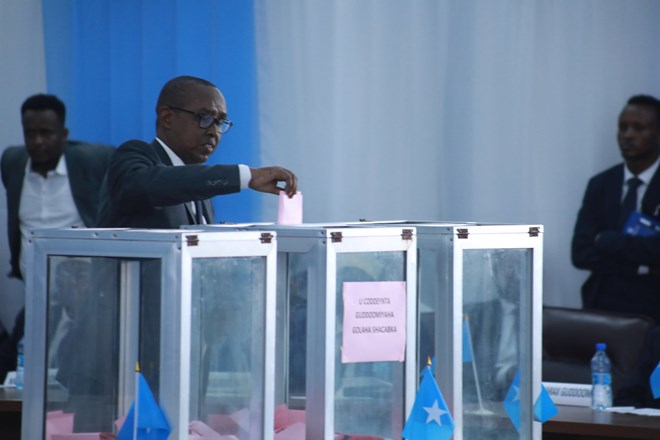By Farah Ahmed Osman
Wednesday May 25, 2022
Wednesday May 25, 2022

Despite numerous attempts, the political situation in the country remained fragile. However, some progress was made in political transitions from 2009 to 2012 as a transitional federal government led by President Sharif Sheikh Ahmed made efforts toward steadying the ship. Hand-picked members of parliament, 135 clan elders through the existing 4.5 clans power-sharing system elected Hassan Sheikh Mohamud in 2012, leading the country out of the transitional period. During this period, the path toward elections slowly started with a smooth handover of power by Sharif Sheikh Ahmed to Hassan Sheikh Mohamud.
In 2016, after four years of Hassan Sheikh’s administration, the country went into an election with a similar process of hand-picking the members of parliament but this time with the creation of the upper house. Mohamed Abdullahi Farmajo was elected president for the following four-year term. The election of Farmajo as president ushered the country into a renewed hope and was welcomed within and outside the country. Jubilations and uproar erupted in and around Mogadishu, the capital city of Somalia and other cities. President Farmajo made notable progress in his first two years at the helm of the country’s leadership. Notably, his administration kick-started and oversaw the biometric registration of the Somali National Army, rehabilitation and reconstruction of government institutions, taking back the control of the country’s airspace and creation of an enabling environment for investors. There was renewed hope that better days were yet to come.
However, the second two years were marred with frosty relations between the federal government and federal member states, particularly Puntland and Jubaland. In addition, the relationship with neighbouring countries of Kenya and Djibouti deteriorated, creating a diplomatic row between Kenya and Somalia that saw both countries calling back their diplomatic representatives for consultations. The deteriorating diplomatic relations between the two countries also affected the businesses, particularly “Qat or Miiraa”. Amidst the diplomatic row, the worsening relationship between the federal government and federal member states was becoming a concern, with no progress towards resolution in sight.
In its quest to push for universal suffrage, one man one vote elections, the federal government received strong opposition from the federal member states, consequently extending the sitting administration’s term to a further two years to oversee the constitutional changes upon which this would be embedded. What followed were sporadic unrests witnessed in the capital, where a military junta led by some opposition politicians and members of the upper house took up arms against the government. With pressure mounting both locally and internationally, the Farmajo administration accepted to track back their demands and handed over power to the prime minister to lead and oversee preparing for elections to save the country from crumbling into anarchy. Consequently, despite the delays and rampant electoral malpractices reported, the government completed the selections of representatives of both the lower and the upper houses of parliament. This culminated in the election of the speakers of both houses, their deputies and preparation for the presidential election.
With over 38 candidates registering for the hotly contested presidential elections, it took three rounds of voting that saw the re-election of the former president, Hassan Sheikh Mohamud. President Farmajo conceded defeat and congratulated the president-elect, a sign that the country was moving in the right direction towards matured democracy. Contrary to widespread misreporting by local media and opposition groups circulating, there is renewed hope that the once beacon of hope in the horn of Africa is slowly but surely crawling back on its feet to rediscover its lost glory. Although the universal one man, one vote election did not take effect in the country, the progress so far points to glaring hope on the road to democracy.